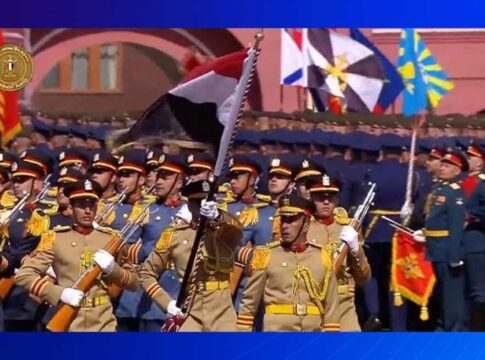Egyptian President Abdel Fattah El-Sisi’s visit to Moscow last week to participate in Russia’s 80th Victory Day celebrations — underscored more than military symbolism. It marked a deepening of Egypt-Russia strategic and economic ties at a time when both countries are recalibrating their positions amid global realignments.
The visit featured Egyptian military personnel marching alongside troops from 12 other nations in Red Square, as part of the commemorations marking the Soviet victory in World War II. It also provided a stage for high-level talks between President El-Sisi and Russian President Vladimir Putin, during which both leaders emphasized accelerating joint economic projects and regional coordination.
In their expanded bilateral session, the two presidents reviewed the status of critical economic collaborations already underway. President El-Sisi reaffirmed Egypt’s commitment to the Comprehensive Strategic Partnership Agreement signed with Russia in 2018 — a framework that governs cooperation across defense, trade, industry, and energy sectors.
Among the key strategic projects highlighted: The Russian Industrial Zone (RIZ) in the Suez Canal Economic Zone (SCZone): A flagship initiative expected to attract over $7 billion in Russian investments and generate thousands of local jobs. Russian firms setting up operations in the zone will benefit from Egypt’s unique geostrategic location, offering access to both African and Middle Eastern markets. The Dabaa Nuclear Power Plant, a $30 billion project co-developed with Russia’s state-owned nuclear corporation Rosatom. The plant is positioned to play a critical role in Egypt’s energy diversification strategy and long-term industrial competitiveness and Expansion of bilateral trade, particularly in grains, fertilizers, machinery, and automobiles, as Russia continues to seek alternative markets in the Global South in the wake of Western sanctions.
Both leaders agreed to fast-track preparations for the upcoming Joint Egyptian-Russian Committee meeting in May 2025, which will finalize new trade, tourism, and investment frameworks.
Russia remains one of Egypt’s top inbound tourism markets. Before the COVID-19 pandemic, over 3 million Russian tourists visited Egypt annually, with popular destinations including Sharm El-Sheikh and Hurghada. In Moscow, President El-Sisi and President Putin underscored the need to significantly increase Russian tourist flows in 2025 and beyond.
To support this, Egypt is working to expand charter flight programs and promote new tourist regions such as Alamein and Luxor. Moscow, for its part, is exploring increased ruble-based payment systems to facilitate easier transactions for Russian travelers amid currency and sanctions constraints.
The visit also reinforced Egypt’s growing role within BRICS+, following its formal accession to the group earlier this year. Egypt’s membership alongside Russia, China, India, Brazil, and South Africa reflects a broader pivot toward multipolarity, particularly in financial coordination and development financing.
“Egypt sees BRICS as an opportunity to build alternative financial mechanisms and reduce dependency on the dollar in international trade,” said Dr. Ahmed Khattab, a political economist at Cairo University. “Russia and Egypt have converging interests in building South-South partnerships, especially in energy and industrial supply chains.”
President El-Sisi and President Putin agreed to intensify coordination within BRICS frameworks, particularly in food security, mining, and joint infrastructure development.
The leaders also reviewed regional hotspots, especially the situation in Gaza. President El-Sisi briefed his Russian counterpart on Cairo’s continued efforts to mediate a ceasefire, facilitate humanitarian aid, and support Gaza’s reconstruction. Putin expressed strong support for Egypt’s diplomatic efforts and its central role in the Gaza Reconstruction Initiative, endorsed by the Extraordinary Arab Summit in Cairo in March 2025.
“The regional security conversation between Cairo and Moscow now extends beyond arms deals into broader stabilization efforts,” said Anna Borshchevskaya, a senior fellow at The Washington Institute. “Egypt’s mediation capacity, paired with Russia’s military leverage in Syria and its diplomatic weight at the UN, creates a natural axis for de-escalation efforts.”
El-Sisi also reaffirmed Egypt’s position advocating for a two-state solution, with East Jerusalem as the capital of an independent Palestinian state along the 1967 borders.
Egypt’s alignment with Russia offers tangible benefits: Technology Transfer & Energy Sovereignty: Through projects like Dabaa, Egypt gains not only energy capacity but also long-term access to nuclear technology and training. Geopolitical Leverage: Egypt positions itself as a non-aligned power capable of engaging both East and West, playing mediator roles in multiple crises (Gaza, Libya, Sudan) and Export Market Diversification: Russia’s pivot to non-Western markets opens new demand for Egyptian agricultural and textile exports.
Exclusive sources within the Egyptian delegation, revealed that Cairo and Moscow are in preliminary discussions to launch a joint sovereign fund mechanism to co-finance infrastructure and logistics hubs across Africa — a move that would significantly bolster Egypt’s continental economic ambitions.
President El-Sisi’s presence in Moscow was more than ceremonial. It highlighted a comprehensive, multifaceted partnership that spans economics, diplomacy, and security. As global powers realign and blocs like BRICS gain weight, Egypt appears intent on carving out a strategic role — one rooted in balanced diplomacy, investment pragmatism, and regional stability.


